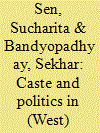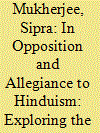| Srl | Item |
| 1 |
ID:
193287


|
|
|
|
|
| Summary/Abstract |
Although many commentators believed that caste did not matter in West Bengal, in recent years it has emerged as a significant factor in electoral politics. The decline of the Left and the rise of the centrist-incumbent have fanned identity politics and the resurgence of caste-based political mobilisation. In this conversation, Sekhar Bandyopadhyay, a well-known expert in the history and politics of caste in Bengal, illuminates the complexities, uniqueness and dynamics of caste politics in colonial Bengal and contemporary West Bengal. The interview explores the evolution of the caste-system in colonial Bengal, its differences with the rest of India and the multiple manifestations of caste-based politics in contemporary West Bengal. Bandyopadhyay reflects on the intersection of caste with other categories of class and religion, the lower-castes’ involvement, appropriation and neglect in the political spectrum, and the future of caste and politics in West Bengal.
|
|
|
|
|
|
|
|
|
|
|
|
|
|
|
|
| 2 |
ID:
159392


|
|
|
|
|
| Summary/Abstract |
The article studies the Bangla hagiography of Harichand Thakur, the founder of the Matua sampraday, a sect that broke away from Brahmanical Hinduism in nineteenth-century Bengal. The paper explores how the hagiography takes on the added task of constructing the collective identity of the Matuas. It argues that for a vulnerable and marginalised community where the hagiography is among the few books published, the text serves to validate the community's aspirations and authenticates its legacy. The sect, founded in opposition to the dominant Brahmanical hegemony that had kept them suppressed for generations, has been an upwardly mobile community in the twentieth century. The essay examines the changing presentations of the hagiography over a century to explore how the Matua community walks a fine line between opposition and allegiance to the majoritarian Hindu faith, and how the indeterminate boundaries between myth and history, fact and fiction, are used in this project of the community's self-construction.
|
|
|
|
|
|
|
|
|
|
|
|
|
|
|
|